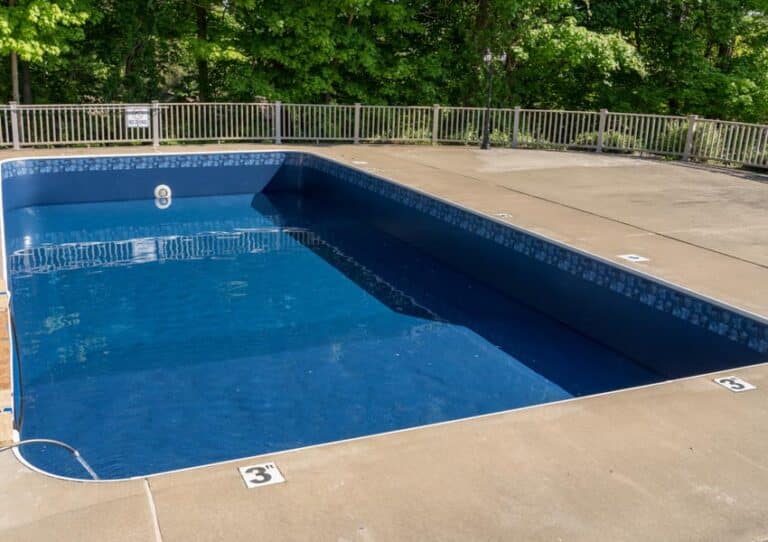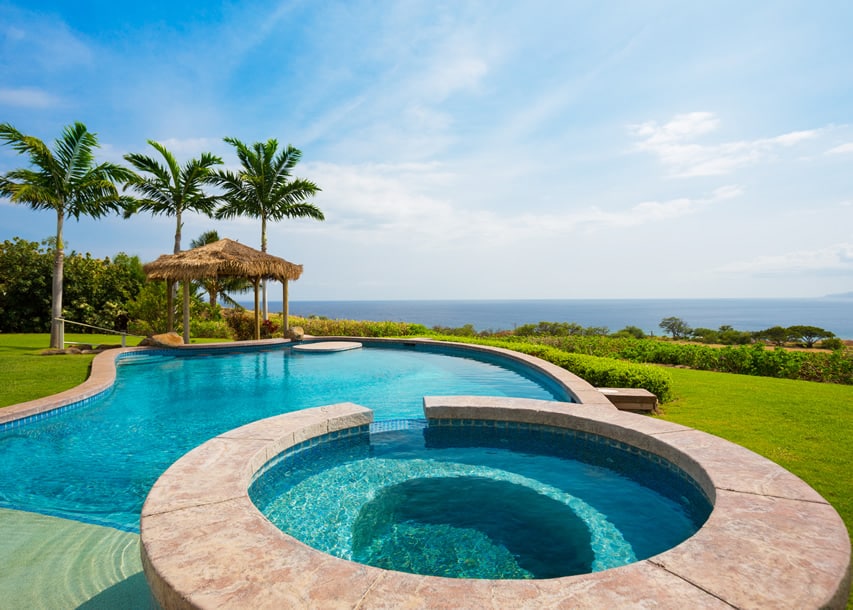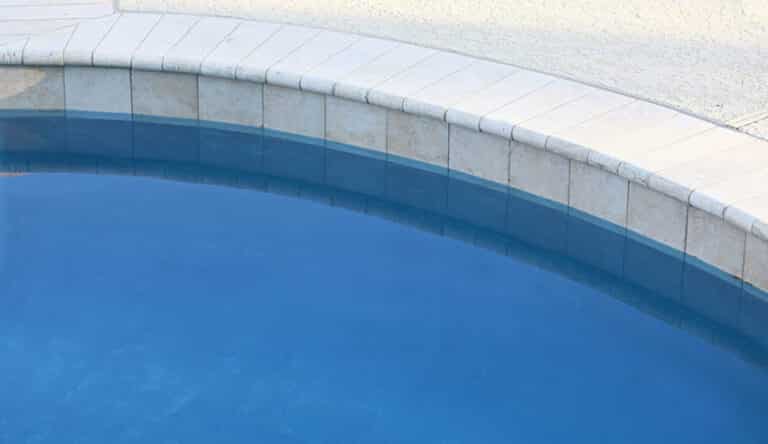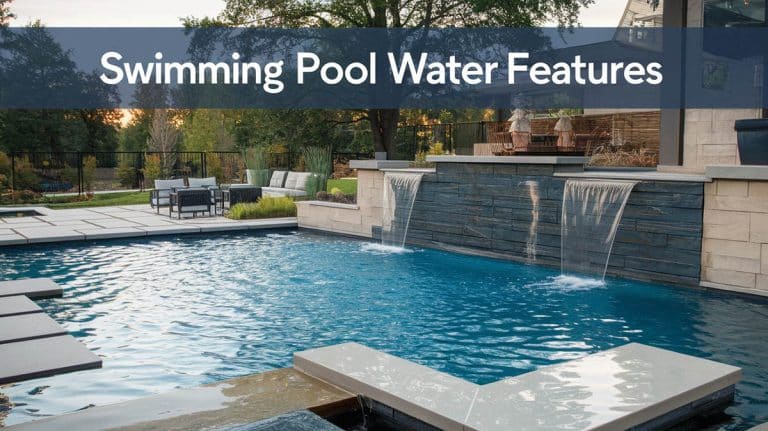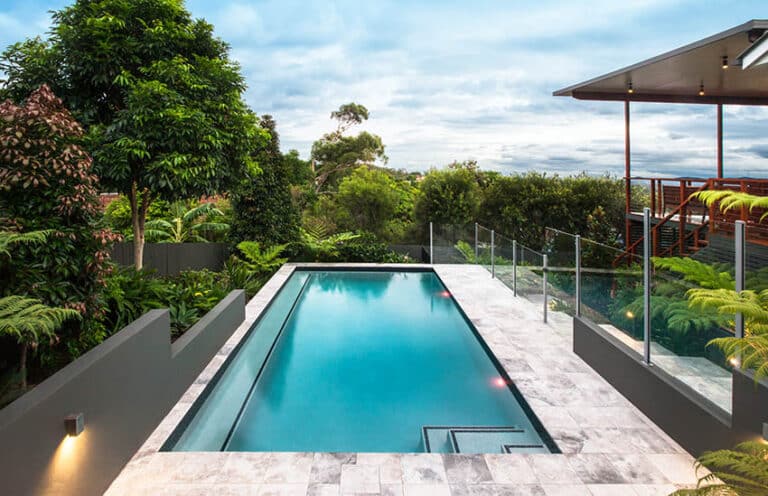Artificial Grass Around Pool (Deck Turf Guide)
Artificial grass has come a long way since its first commercial application, as new materials and advances in its manufacturing process have led to a more natural-looking and durable product. When you consider the costs associated with maintaining natural turf, using artificial grass is more cost-effective, making it a practical option for your pool deck surface.
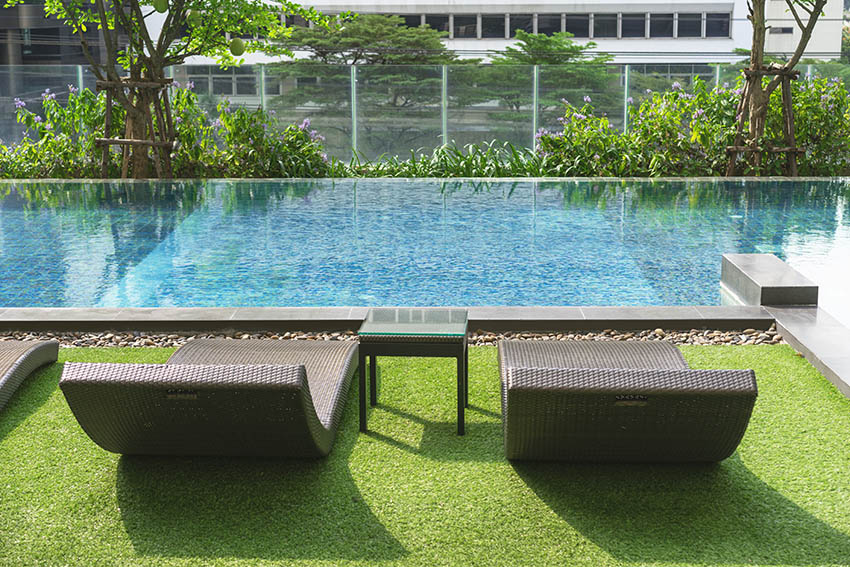
Installation is relatively simple. Even with little time, a few friends, and good old elbow grease, you can have a great-looking, low-maintenance lawn for years to come.

Upload a photo and get instant before-and-after room designs.
No design experience needed — join 2.39 million+ happy users.
👉 Try the AI design tool now
What Is An Artificial Turf Pool Deck?
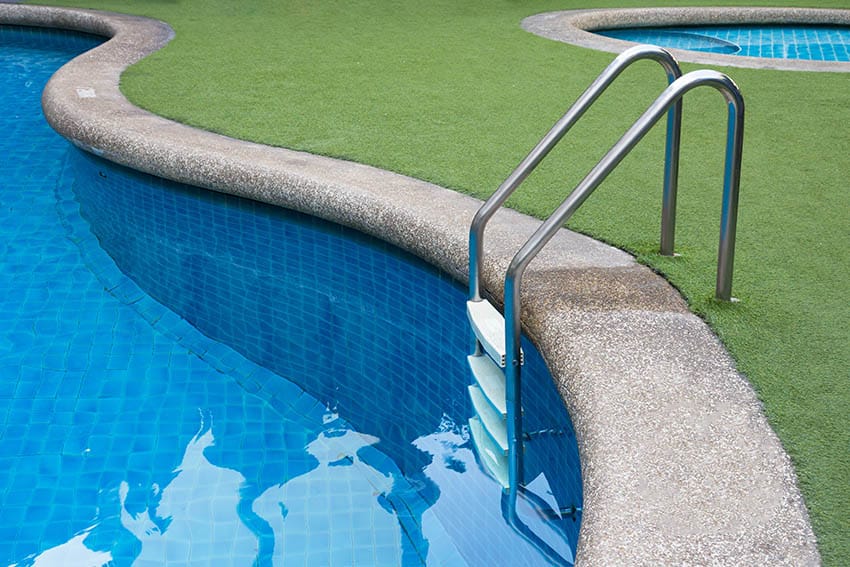
An artificial turf pool deck is a permeable surface that is typically made from synthetic fiber material that simulates the look and feel of real grass.
Artificial turf is a safe, non-slip surface, which makes it ideal for use around a pool area. A non-slip surface is critical around pool areas, which can quickly become wet and hazardous. Since artificial turf does not grow as hot as concrete, it’s better than concrete patio finishes or brickwork.
The very first artificial turf was installed in 1964 at the Moses Brown School in Providence, Rhode Island. Then, in 1966, the artificial turf gained its first commercial success when it was installed in the Astrodome in Houston, Texas.
There are several varieties to choose from with different colors to choose from that can suit your preferences, but before selecting your artificial turf, know the pros and cons of using this type of surface:
Pros and Cons of Fake Grass Around Pool
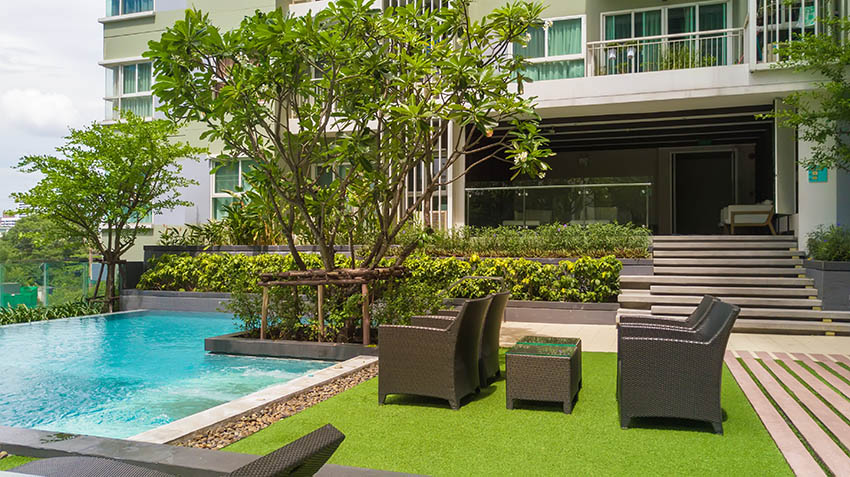
1. Minimal Maintenance. On average, natural grass can grow around 2 to 6 inches a week depending on the natural conditions, such as location, temperature, humidity, and time of the year.
This means you’ll need bimonthly or, at its utmost, monthly work of mowing off your pool deck grass. On top of this, you need to water and clean your natural grass periodically.
With artificial grass, you only need to sweep or rake off your pool deck and do occasional pressure washing to get rid of dirt.
2. Lower Maintenance Costs. As you save time and effort, artificial grass cuts down your maintenance costs. No added costs on your water bills or the need to hire someone regularly to mow and clean off your grass surround. Lower maintenance cost is a major plus for all pool sizes.
3. Conserves Water. Since you don’t need water to maintain the lush green in your backyard surroundings, you save water in the long run.
Artificial grass can save you as much as 40 gallons of water per square foot annually, and if you’ve got a spacious pool surround, that’s a significant impact in saving water.
4. Hypoallergenic. Outdoor spores from grass or pollen can cause allergic reactions in some people and even pets. With synthetic grass, you don’t have a problem with these allergens getting into the air, making your pool deck safe for all people and pets alike.
5. Insect-Free. One reason for you and your pet to love artificial grass is that ticks, bugs, and other pests can’t thrive on the synthetic surface.
6. No Pesticides Applied. Pesticides and other chemicals applied to natural grass regularly can release harmful fumes and chemical surface runoffs that can get to your pool, surrounding land, and other bodies of water.
Artificial turf doesn’t require you to use these harmful pesticides thus, minimizing their harmful effects on the environment.
7. Even Surface. A lumpy and bumpy surface on your pool’s deck is both unsafe and an eyesore. Good thing you’ll never have to deal with the meticulous process of leveling out your deck surface with imitation sod. With a properly installed artificial turf, you’ll get an even surface area all year long.
8. Durable & Long-Lasting. Artificial turf around pools for domestic use can have 12 to 15 years of service life on average. Factors that can affect the lifespan of your lawn faux include mainly its quality, location, and traffic patterns.
Top artificial turf brands can last up to 20 years as they contain technologically enhanced components such as UV resistance and antimicrobial.
9. Quick Use and Installation. As we want to enjoy our pool before the summer days run out, imitation sod is the best option.
You can quickly install your grass turf within the day. But speed will depend on your location, area coverage, and your design. The more complicated your pool’s edges or shape, the longer and the more labor is needed.
You can use pool design software to help you determine the amount of square footage needed.
Installing a plastic lawn is fairly easy with the right tools, friends, and minimal DIY skills. You can always hire a professional faux lawn installer, guaranteeing a seamless look, faster, and correctly installed.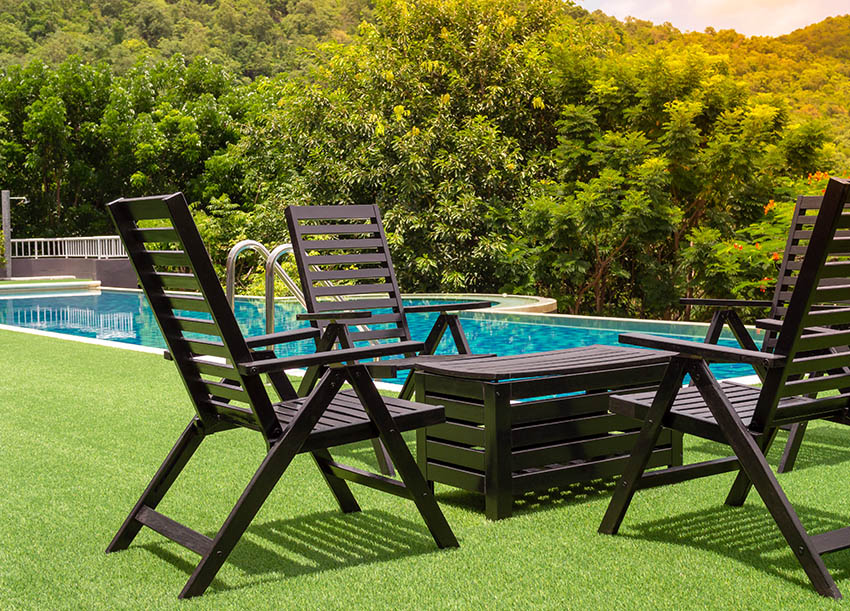
Cons
1. Heat Build-up. Since your synthetic lawn is generally made from synthetic materials, it absorbs heat from direct sunlight that can reach about 20 to 50° F higher than natural grass, at the same temperature as asphalt surfaces.
You can avoid walking on an uncomfortable pool deck surface by choosing artificial turf made from technologically advanced materials that dissipate heat instead. This reflective surface ensures that your deck remains cool even under direct sunlight.
2. Breeding Ground for Bacteria. Over time, bacteria can grow in your artificial turf, particularly on the infill between the strands.
To prevent bacteria and mold from growing in your synthetic turf, always spot clean and use high-pressured water from time to time to rinse off debris and stains from your deck.
3. Gas-Off. While you’ll never worry about using fertilizers on your artificial deck grass, your faux lawn can release harmful and unpleasant smells, especially when exposed to direct sunlight.
Select artificial turf around your aquatic feature made from UV-resistant materials that won’t easily melt or bake under the sun. There are also artificial turfs that are made from plant-based grass and can be recycled.
Is Artificial Turf Good Around Pools?
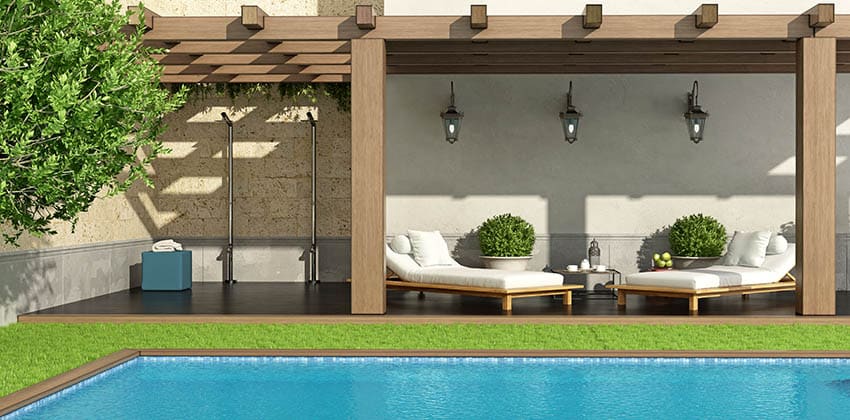
Fake turf has a great advantage over real grass, especially in terms of controlling bacteria build-up and durability. This means you can keep mold and mildew at bay with regular cleaning and keeping your faux lawn dry and damp-free.
Another great advantage of synthetic lawns is that you get an even slip-free surface required in a deck area to prevent accidents.
Well-known brands include TigerTurf, DowDuPont, Limonta, SIS Pitches, Tarkett, and Act Global. Fake turf brand names specializing in sports venues.
For domestic use, reputable brands include Field Turf, Superturf, Neograss, and Astroturf. Most of these brands, like the Neograss, use advanced technology that keeps the plastic fibers cool even under direct sunlight, making it a suitable option for synthetic turf around your aquatic facility.
Does Pool Chlorine Ruin Synthetic Grass?
Chlorine from tap water cannot affect synthetic lawns. The most damage chlorine can do is a buildup of chlorine deposits that will appear as white specks or can discolor your plastic grass.
Chlorine can be easily washed off with chlorine cleaners and should be done periodically to prevent it from building up over time.
There are artificial lawn brands that don’t change color even from exposure to chlorine, such as SGW or Synthetic Grass Warehouse and RealTurf.
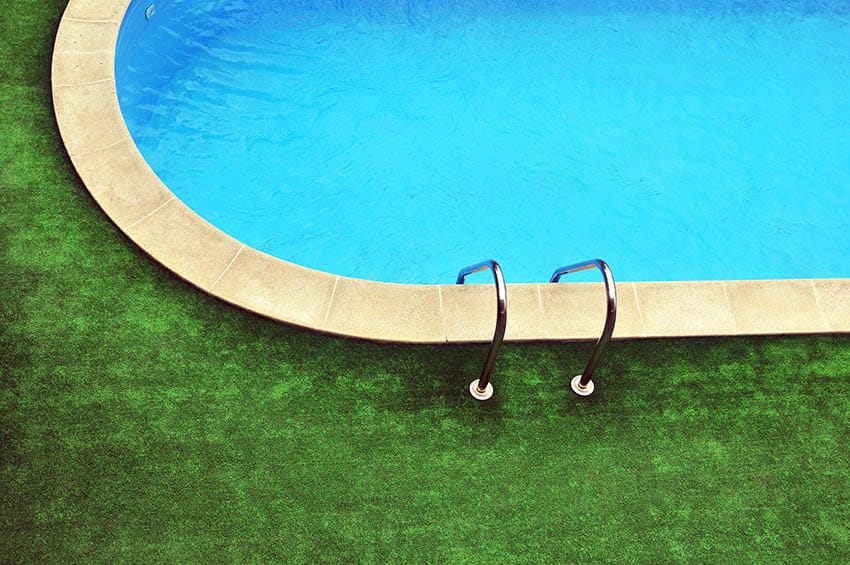
Will Decking Ruin Synthetic Turf?
Taking the necessary precautions and correct installation of your decking should keep it from rotting under the imitation lawn.
In addition, it is preferred to place a shock-pad or overlay on your decking before laying out your plastic lawn. This substrate sheet will keep off unsightly weeds from growing between your deck and synthetic lawn.
Is an Underlay Necessary for Fake Turf?
While it isn’t necessary, it is recommended to place an underlay, as it protects your decking and prevents weeds from growing between your faux lawn surface and the decking. It should be installed on top of soil or sand to keep it from bulging.
What Do You Put Under Artificial Grass On Decking?
Generally, an underfelt or plywood can be used to get rid of the gaps on your decking.
Shock pads can be used, especially for high-traffic areas, to help protect both your artificial lawn and decking. The overlay prevents unwanted plants from growing along the synthetic lawn.
For more related information, take a look at our swimming pool fence ideas gallery.

